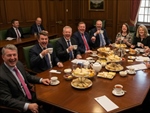#PhoneHackingScandal

#PhoneHackingScandal

The News of the World phone hacking scandal was a major media and political controversy in the United Kingdom that came to light in the early 2000s and peaked in 2011. Journalists and private investigators working for the British tabloid were found to have illegally accessed the voicemails of celebrities, politicians, members of the royal family, and even victims of crime, most notably murdered schoolgirl Milly Dowler. The revelation that the tabloid had deleted voicemails from Dowler’s phone sparked public outrage and led to the closure of the 168-year-old newspaper in July 2011. The scandal prompted multiple police investigations, high-profile arrests, and the Leveson Inquiry—a public investigation into press ethics and regulation. It exposed deep ethical failures within parts of the British press and raised serious concerns about media power and accountability.
HCL Firm Asked Nine Times by News International to Delete Emails
- Monday, 01 August 2011
HCL, an India-based IT firm with a contract with News International, told Parliament that it received nine requests for advice on deleting large numbers of emails between April 2010 and July 2011. The requests included deleting old mailboxes belonging to former employees, over 200,000 delivery failure messages, and working with another company to delete archive emails to make them more manageable. HCL's lawyer stated that the firm was aware of nothing abnormal or inconsistent with its contractual role and did not store any data for News International, making it "utterly without foundation" to suggest that HCL deleted material on behalf of the publisher.
Murdoch Scandal: Cameron Demanded to Come Clean Over Ties with Media Mogul
- Sunday, 31 July 2011

Labour has called on Prime Minister David Cameron to "come clean" over his dealings with the Murdoch family amid the phone-hacking scandal. The party sent letters to Cabinet ministers containing 50 unanswered questions, including what discussions Cameron had with James or Rupert Murdoch and Rebekah Brooks about their attempt to take full control of BSkyB. Labour is also seeking answers on Andy Coulson’s arrest and whether Cameron spoke to him after his arrest. Shadow culture secretary Ivan Lewis stated that the signs suggest Cameron still does not get it, implying that he has failed to put a proper distance between himself and senior News Corp executives during the consideration of the BSkyB bid.
Met Police Launches Probe into Computer Hacking Allegations Following News of the World Scandal
- Saturday, 30 July 2011
The Metropolitan Police has launched Operation Tuleta to investigate computer hacking allegations, including the use of "Trojan horse" viruses. The probe follows claims that private investigator Glenn Mulcaire hacked into phones and computers on behalf of the News of the World. Mulcaire's legal team says he acted on orders from others, not unilaterally for the newspaper. The investigation is separate from Operation Weeting, which probed phone hacking.
Murdoch to Face Recall: UK Committee Seeks Clarification on Phone Hacking Testimony Inconsistencies
- Friday, 29 July 2011

According to the provided text, the UK's parliamentary committee is considering recalling James Murdoch, News Corporation chairman, to clarify inconsistencies in his previous testimony. This comes after two former News International journalists contradicted his account, and new evidence emerged that a murder victim's mother may have been a phone hacking victim. The move follows Labour Party leader Harriet Harman’s call for the committee to "get to the bottom of where the truth lies."




















